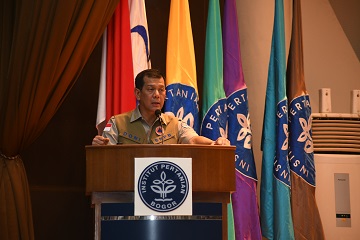Disaster Public Lecture Lt. Gen. Doni Monardo at IPB

“Natural disasters should be both a lesson and teachers that are valuable to us and the government. For this reason, efforts to minimize casualties are very important. Anticipation steps need to be prepared in advance so that when natural disasters occur, the community is ready to save themselves,” said Head of the National Disaster Management Agency (BNPB), TNI Lieutenant General Doni Monardo while giving a public lecture at IPB University, in Dramaga Campus, Bogor (19/3). On the same occasion, a Memorandum of Understanding (MoU) was signed between IPB and BNPB, Majalengka University, Kuningan University, Jember State Polytechnic and West Java Scouts Regional Quartir.
In 2018, based on BNPB data alone, 2,572 disasters occurred in the country. Claimed 4,814 people were killed, 21,083 injured and 10.3 million displaced. The loss of buildings recorded 574,838 damaged houses and 2,699 units of public facilities also suffered damage from the disaster.
“Just from the earthquake, the potential for economic losses is estimated at 405 trillion, not including the potential for long-term economic losses due to disasters. Because the influence of disaster events on the economic dynamics of this nation is very high, it must be managed properly.”
He said the disaster continued to come on the beloved earth, we were shocked by the flash flood in Sentani which claimed more than 70 lives. Likewise, several other regions have experienced the same things such as in Merauke, Yogyakarta, and aftershocks in Lombok. The number of disasters and their losses, it is necessary to have a synergic effort to anticipate natural disasters in the region (coastal city warning).
Based on data compiled, Indonesia is ranked in the top 35 countries with high disaster risk where more than 40 percent of the population is exposed to disasters. Disaster threats in Indonesia covering 200 regencies/cities are in a medium-high hazard area of the tsunami in Indonesia, 4.8 million people are exposed to medium-high hazards from the tsunami.
Indonesia is the highest country in the world that has a population exposed to the tsunami. In Indonesia there are 127 active volcanoes (13 percent of volcanoes in the world), there are 75 regencies and cities in medium-high hazard areas of volcanic eruptions in Indonesia and 3.85 million people are exposed to medium-high hazards from volcanic eruptions.
Then 315 regencies or cities are in a medium-high danger area of flooding in Indonesia and 60.9 million people are exposed to medium-high hazards from flooding. Whereas for 404 regencies or cities in the medium-high hazard area of the tornado in Indonesia and 114.8 million residents are exposed to the medium-high danger of tornadoes. While for earthquake hazard 411 regencies or cities are in medium-high hazard areas of earthquakes in Indonesia and 218.2 million people are exposed to medium-high hazards from earthquakes. Whereas the landslide hazards of 27 regencies/cities are in medium-high hazard areas from landslides in Indonesia and 124 million people are exposed to medium-high hazards from landslides.
“Residents in the disaster area also need to be given disaster education from the start. The government and universities must be able to change the mindset of the community to protect the environment, forests, and rivers. The amount of waste in the rivers results in very dangerous fishes contaminated with mercury. The trees in the forest do not continue to be cut down because the forest can absorb water and can overcome floods and tsunami. For this reason, the community is given an understanding of the importance of safeguarding it all, they must also be trained to know what is done when a disaster comes. Students need to be trained to look for shelter such as sheltering under a table if they don’t have time to empty the building. Those who work in high-rise buildings must be trained to vacate buildings quickly and precisely if there is an alarm regarding disasters.
While the Rector of IPB, Dr. Arif Satria said that now is a collaboration era or a mutually complementary era in supporting needs. For this reason, IPB carried out a memorandum of understanding as a beginning to improve cooperation with several universities, BNPB and the West Java Scouts Regional Quartir.
“In this era of collaboration, we cannot do something only by ourselves anymore. The ability to collaborate is now an ability in the future because the required skills or competencies needed in the present era include collaboration skills, communication skills, and creative abilities. Related to disasters that often affect the Indonesian homeland, natural disasters can occur due to natural factors and can occur due to human activities. Humans themselves cause the disaster itself. For the duty of all stakeholders, both the government and universities to provide continuous direction to the public about the importance of protecting nature,” said the Rector.
The Rector added that the community must have knowledge and skills in dealing with disasters. With the hope that preparedness can be useful in determining the right steps in anticipating and minimizing the loss of lives. All can be done with regular and continuous simulations of disaster management exercises. (RYS)


